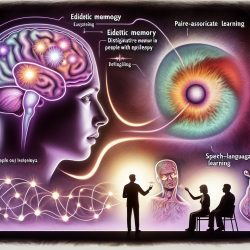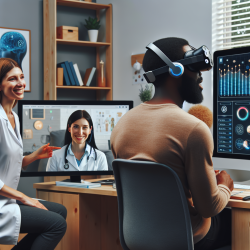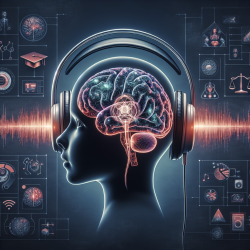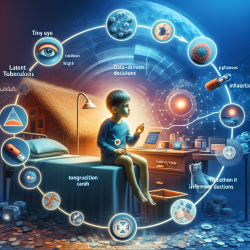Introduction
The concept of eidetic memory, often romanticized in popular culture, remains a subject of intrigue and scientific inquiry. While rare, it is most commonly observed in children and is believed to be influenced by developmental changes in the brain. Recent research, as outlined in the study "The Possibility of Eidetic Memory in a Patient Report of Epileptogenic Zone in Right Temporo-Parietal-Occipital Cortex," provides a fascinating case of a patient with epilepsy exhibiting near-eidetic memory abilities. This blog delves into the implications of these findings for practitioners in the field of speech language pathology, particularly those working with children.
Understanding Eidetic Memory in the Context of Epilepsy
Traditionally, epilepsy is associated with memory impairments due to disruptions in the excitatory/inhibitory balance within the brain. However, the case study presented in the research challenges this notion by highlighting a patient with focal epilepsy in the right temporo-parietal-occipital cortex who demonstrated exceptional paired-associate learning abilities.
This patient, despite having medically refractory epilepsy, exhibited a near-eidetic ability in both short-term and long-term retention of paired-associates learning tasks. This finding suggests that certain neurological conditions may, under specific circumstances, enhance cognitive functions rather than impair them.
Implications for Practitioners
For practitioners in speech language pathology, particularly those working with children, these findings open up new avenues for understanding and supporting memory and learning processes. Here are some key takeaways:
- Neuroplasticity and Learning: The case underscores the importance of considering neuroplasticity and the potential for compensatory mechanisms in the brain. This perspective can be invaluable when designing interventions for children with neurological conditions.
- Individualized Approaches: Recognizing that each child's neurological makeup is unique can lead to more personalized and effective therapeutic strategies. This case exemplifies the need for tailored approaches that consider the potential for enhanced cognitive abilities.
- Further Research: Encouraging further research into the relationship between epilepsy and cognitive enhancement could lead to breakthroughs in understanding how to harness these abilities in therapeutic settings.
Encouraging Further Exploration
The potential for enhanced cognitive abilities in individuals with epilepsy, as demonstrated in this case, invites practitioners to explore innovative approaches in therapy. By staying informed about emerging research and being open to new possibilities, speech language pathologists can better support children in reaching their full potential.
To read the original research paper, please follow this link: The Possibility of Eidetic Memory in a Patient Report of Epileptogenic Zone in Right Temporo-Parietal-Occipital Cortex.










